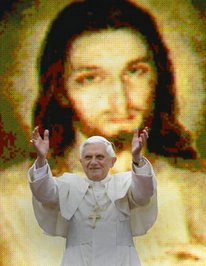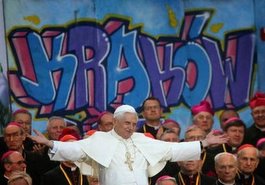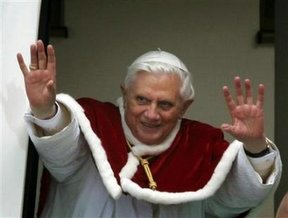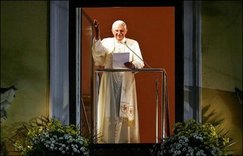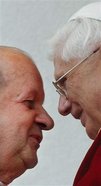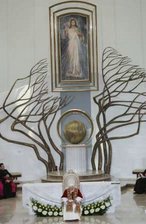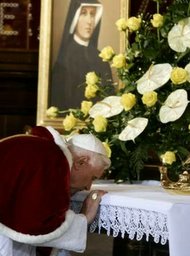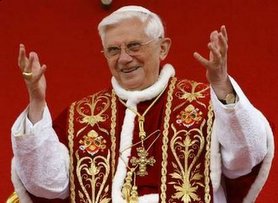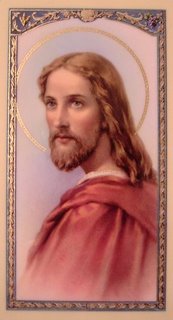Wednesday, May 31, 2006
Pope's Reflections On Poland Trip
Here is the Pope's message during his Wednesday Audience:
Dear Brothers and Sisters:
Today I wish to go over with you the stages of the apostolic trip I made in recent days to Poland. I thank the Polish episcopate, in particular the metropolitan archbishops of Warsaw and Krakow, for the zeal and care with which they prepared this visit. I again express my gratitude to the president of the republic and to the country's different authorities, as well as to all those who have cooperated in the success of this event.
Above all I wish to thank from my heart the Catholics and the whole Polish people, as I have felt their embrace full of human and spiritual warmth. Many of you have seen it on television. It was a true expression of catholicity, of love of the Church, which is expressed in love for the Successor of Peter. After the arrival at Warsaw airport, the place of my first appointment reserved for priests was the cathedral of that important city on the day that the 50th anniversary was being celebrated of the priestly ordination of Cardinal Jozef Glemp, pastor of that archdiocese. In this way, my pilgrimage began with the sign of the priesthood and it continued later with the ecumenical solicitude witnessed in the Lutheran Church of the Most Holy Trinity.
On that occasion, together with the representatives of the different churches and ecclesial communities that live in Poland, I confirmed the firm decision to consider the commitment for the reconstruction of full and visible unity among Christians as an authentic priority of my ministry. Then there was the solemn Eucharistic celebration in Pilsudski Square, full of people, in the center of Warsaw. This place, in which we solemnly celebrated the Eucharist with joy, had a symbolic value, as it had hosted historical events such as the holy Masses celebrated by John Paul II and the funeral of the Cardinal Primate Stefan Wyszynski, as well as some of the large celebrations for the repose of his soul in the days after the death of my venerated predecessor.
The program could not but include a visit to the shrines that marked the life of Karol Wojtyla as priest and bishop, above all three: that of Czestochowa, of Kalwaria Zebrzidowska and of Divine Mercy. I will not be able to forget the visit to the famous Marian shrine of Jasna Gora. On that Clear Mountain, heart of the Polish nation, as if it were a cenacle, very many faithful, especially men and women religious, seminarians and representatives of the ecclesial movements, gathered around the Successor of Peter to listen with me to Mary. Inspired by the wonderful Marian meditation that John Paul II gave the Church in the encyclical "Redemptoris Mater," I wished to propose the faith again as a fundamental attitude of the spirit, which is not something merely intellectual or sentimental. Authentic faith involves the whole person: his thoughts, affections, intentions, relationships, corporeal nature, activity and daily work.
Later visiting the wonderful shrine of Kalwaria Zebrzydowska, near Krakow, I prayed to Our Lady of Sorrows to support the faith of the ecclesial community in moments of difficulty and trial; the successive stage at the Shrine of Divine Mercy in Lagiewniki, allowed me to emphasize that only Divine Mercy illuminates the mystery of man. In the convent near this shrine, on contemplating the luminous wounds of the risen Christ, Sister Faustina Kowalska received a message of confidence for humanity, the message of Divine Mercy, which John Paul II echoed and of which he became the interpreter. It is a really central message for our time: Mercy as the force of God, as the divine limit against the evil of the world. I wished to visit other symbolic "shrines": I am referring to Wadowice, the locality which has become famous because Karol Wojtyla was born and was baptized there.
The visit gave me the opportunity to thank the Lord for the gift of this tireless servant of the Gospel. The roots of his strong faith, of his very sensitive and open humanity, of his love of beauty and truth, of his devotion to the Virgin, of his love of the Church and above all of his vocation to holiness are found in this small city in which he received his early education and formation. Another place loved by John Paul II is Wawel Cathedral in Krakow, a symbolic place for the Polish nation: Karol Wojtyla celebrated his first Mass in the crypt of that cathedral. Another very beautiful experience was the meeting with young people, which took place in Krakow, in the great Blonie Park. I handed symbolically to the numerous young people the "Flame of Mercy" so that they will be heralds of Love and Divine Mercy in the world.
With them I meditated on the Gospel passage of the house built on the rock (cf. Matthew 7:24-27), read also today at the beginning of this audience. I paused to reflect also on the Word of God on Sunday morning, solemnity of the Ascension, during the conclusive celebration of my visit. It was a liturgical meeting animated by the extraordinary participation of the faithful in the same park in which, the previous night, the appointment with young people had taken place. I took advantage of the opportunity to renew before the Polish people the wonderful proclamation of the Christian truth about man, created and redeemed in Christ; that truth that John Paul proclaimed with vigor on so many occasions to encourage all to remain firm in faith, hope and love. "Stand firm in the faith." This is the instruction he has left the children of his beloved Poland, encouraging them to persevere in faithfulness to Christ and to the Church so that Europe and the world will never lack the contribution of her evangelical testimony.
All Christians must feel committed to give this testimony so as to avoid that humanity of the third millennium might again know new horrors similar to those tragically evoked by the death camp of Auschwitz-Birkenau. In fact before returning to Rome I wished to pause in this place sadly known throughout the world. In the Auschwitz-Birkenau camp, as in other similar camps, Hitler had 6 million Jews exterminated. In Auschwitz-Birkenau some 150,000 Poles and tens of thousands of men and women of other nationalities also died. In the face of the horror of Auschwitz there is no other answer than the cross of Christ: Love that descends to the abyss of evil to save man in his innermost being, where his freedom can rebel against God.
May today's humanity not forget Auschwitz and the other "death factories" in which the Nazi regime tried to eliminate God to take his place! May people again know that God is Father of all and that he calls us all in Christ to build together a world of justice, truth and peace! We want to ask this of the Lord through the intercession of Mary, whom today, at the conclusion of the month of May, we contemplate visiting with diligence and love her elderly relative Elizabeth.
Little Crown of Mary
Today is this year's last day of May. I invite you to recite the Little Crown of Mary in honor of the Queenship of Mary.
The Little Crown of the Blessed Virgin Mary
The beloved disciple Saint John the Evangelist was granted the blessing of the vision of a woman crowned with twelve stars, clothed with the sun, and the moon under her feet. According to expert commentators, most specifically the Haydock Commentary in the Douay-Rheims version, this woman is the Blessed Virgin Mary,
with her virtues and her privileges, especially that of her divine maternity.Thus originated the Little Crown of the Twelve Stars of the Blessed Virgin Mary,
which Saint John Calasanctius, Saint John Berchmans and many other saints made
it a practice to recite frequently, especially during Mary's Month of May.
In order to make this prayer more attractive, Saint Louis Marie de Montfort added to each Hail Mary one of the praises of the Blessed Virgin, with the invocation: "Rejoice, O Virgin Mary; rejoice a thousand times."
It is this prayer which St. Louis gave to his religious families (The Montfort Fathers and the Daughters of Wisdom) as their morning prayer. He also recommends it to all those who embrace the devotion of the holy and loving slavery of Jesus through Mary. We combine with this beautiful prayer at the very beginning the designated flower and virtue for the day throughout Mary's month for she is the Queen of the May.
I. Crown of Excellence
(To honor the divine maternity of the Blessed Virgin, her ineffable virginity, her purity without stain and her innumerable virtues.)
1. Our Father, Hail Mary
Blessed art thou, O Virgin Mary, who didst bear the Lord, the Creator of the world; thou didst give birth to Him Who made thee, and remainest a virgin forever.
Rejoice, O Virgin Mary; rejoice a thousand times!
2. Hail Mary
O holy and immaculate Virgin, I know not with what praise to extoll thee, since thou didst bear in thy womb the very One Whom the Heavens cannot contain.
Rejoice, O Virgin Mary; rejoice a thousand times!
3. Hail Mary
Thou art all fair, O Virgin Mary, and there is no stain in thee.
Rejoice, O Virgin Mary; rejoice a thousand times!
4. Hail Mary
Thy virtues, O Virgin, surpass the stars in number.
Rejoice, O Virgin Mary; rejoice a thousand times!
II. Crown of Power
(To honor the royalty of the Blessed Virgin, her magnificence, her universal mediation and the strength of her rule as Queen of Heaven and earth.)
5. Our Father, Hail Mary
Glory be to thee, O Empress of the world! Bring us with thee to the joys of Heaven.
Rejoice, O Virgin Mary; rejoice a thousand times!
6. Hail Mary
Glory be to thee, O treasure house of the Lord's graces! Grant us a share in thy riches.
Rejoice, O Virgin Mary; rejoice a thousand times!
7. Hail Mary
Glory be to thee, O Mediatrix between God and man! Through thee may the Almighty be favorable to us.
Rejoice, O Virgin Mary; rejoice a thousand times!
8. Hail Mary
Glory be to thee who destroyest heresies and crushest demons! Be thou our loving guide.
Rejoice, O Virgin Mary; rejoice a thousand times!
III. Crown of Goodness
(To honor the mercy of the Blessed Virgin towards sinners, the poor, the just, and the dying.)
9. Our Father, Hail Mary
Glory be to thee, O refuge of sinners! Intercede for us with God.
Rejoice, O Virgin Mary; rejoice a thousand times!
10. Hail Mary
Glory be to thee, O Mother of orphans! Render the Almighty favorable to us.
Rejoice, O Virgin Mary; rejoice a thousand times!
11. Hail Mary
Glory be to thee, O joy of the just! Lead us with thee to the joys of Heaven.
Rejoice, O Virgin Mary; rejoice a thousand times!
12. Hail Mary
Glory be to thee who art ever ready to assist us in life and in death! Lead us with thee to the kingdom of Heaven!
Rejoice, O Virgin Mary; rejoice a thousand times!
Glory be to the Father
LET US PRAY
Hail, Mary, Daughter of God the Father;
Hail, Mary, Mother of God the Son;
Hail, Mary, Spouse of the Holy Ghost;
Hail, Mary, Temple of the most Holy Trinity;
Hail, Mary, my Mistress, my treasure, my joy, Queen of my heart; my Mother, my life, my sweetness, my dearest hope - yea, my heart and my soul! I am all thine and all that I have is Thine, O Virgin blessed above all things!
Let thy soul be in me to magnify the Lord; let thy spirit be in me to rejoice in God. Set thyself, O faithful Virgin, as a seal upon my heart, that in thee and through thee I may be found faithful to God. Receive me, O gracious Virgin, among those whom thou lovest and teachest, whom thou leadest, nourishest and protectest as thy children.
Grant that for love of thee I may despise all earthly consolations and ever cling to those of Heaven until, through the Holy Ghost, thy faithful Spouse, and through thee, His faithful spouse, Jesus Christ thy Son be formed in me for the glory of the Father.
Amen.
Daily Catholic
The Feast of the Visitation
The Visitation
And Mary rising up in those days went into the hill country with haste, into a city of Juda. [Lk. 1:39]
How lyrical that is, the opening sentence of St. Luke's description of the Visitation. We can feel the rush of warmth and kindness, the sudden urgency of love that sent that girl hurrying over the hills. "Those days" in which she rose on that impulse were the days in which Christ was being formed in her, the impulse was his impulse.
Many women, if they were expecting a child, would refuse to hurry over the hills on a visit of pure kindness. They would say they had a duty to themselves and to their unborn child which came before anything or anyone else.
The Mother of God considered no such thing. Elizabeth was going to have a child, too, and although Mary's own child was God, she could not forget Elizabeth's need—almost incredible to us, but characteristic of her.
She greeted her cousin Elizabeth, and at the sound of her voice, John quickened in his mother's womb and leapt for joy.
I am come, said Christ, that they may have life and may have it more abundantly. [Jn. 10, 10] Even before He was born His presence gave life.
With what piercing shoots of joy does this story of Christ unfold! First the conception of a child in a child's heart, and then this first salutation, an infant leaping for joy in his mother's womb, knowing the hidden Christ and leaping into life.
How did Elizabeth herself know what had happened to Our Lady? What made her realize that this little cousin who was so familiar to her was the mother of her God?
She knew it by the child within herself, by the quickening into life which was a leap of joy.
If we practice this contemplation taught and shown to us by Our Lady, we will find that our experience is like hers.
If Christ is growing in us, if we are at peace, recollected, because we know that however insignificant our life seems to be, from it He is forming Himself; if we go with eager wills, "in haste," to wherever our circumstances compel us, because we believe that He desires to be in that place, we shall find that we are driven more and more to act on the impulse of His love.
And the answer we shall get from others to those impulses will be an awakening into life, or the leap into joy of the already wakened life within them.
Catholic Culture
Holy Spirit Novena: Sixth Day
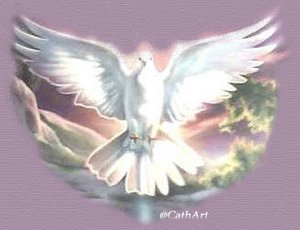 SIXTH DAY (Wednesday, 7th Week of Easter)
SIXTH DAY (Wednesday, 7th Week of Easter)If Thou take Thy grace away, nothing pure in man will stay, All his good is turn'd to ill.
The Gift of Understanding
Understanding, as a gift of the Holy Spirit, helps us to grasp the meaning of the truths of our holy religion BY faith we know them, but by Understanding we learn to appreciate and relish them. It enables us to penetrate the inner meaning of revealed truths and through them to be quickened to newness of life. Our faith ceases to be sterile and inactive, but inspires a mode of life that bears eloquent testimony to the faith that is in us; we begin to "walk worthy of God in all things pleasing, and increasing in the knowledge of God."
Prayer
Come, O Spirit of Understanding, and enlighten our minds, that we may know and believe all the mysteries of salvation; and may merit at last to see the eternal light in Thy Light; and in the light of glory to have a clear vision of Thee and the Father and the Son. Amen.
Our Father and Hail Mary ONCE.
Glory be to the Father SEVEN TIMES.
Act of Consecration, Prayer for the Seven Gifts
Image from here
Tuesday, May 30, 2006
St. Jeanne D'Arc
One of my favorite saints is St. Joan of Arc because her life exemplified the trust and obedience to the will of God even through terrible adversities and at such a young age. She is a model of holy courage and patient endurance. The account of her passion moves one to pray for her intercession. Her feast day is May 30.
 One of five children born to Jacques d'Arc and Isabelle Romee. Shepherdess. Mystic. From age 13 she received visions from Saint Margaret of Antioch, Saint Catherine of Alexandria, and Michael the Archangel.
One of five children born to Jacques d'Arc and Isabelle Romee. Shepherdess. Mystic. From age 13 she received visions from Saint Margaret of Antioch, Saint Catherine of Alexandria, and Michael the Archangel.In the early 15th century, England, in alliance with Burgundy, controlled most of what is modern France. In May 1428 Joan's visions told her to find the true king of France and help him reclaim his throne. She resisted for more than three years, but finally went to Charles VII in Chinon and told him of her visions. Carrying a banner that read "Jesus, Mary", she led troops from one battle to another. She was severely wounded, but her victories from 23 February 1429 to 23 May 1430 brought Charles VII to the throne. Captured by the Burgundians during the defence of Compiegne, she was sold to the English for 10 thousand francs. She was put on trial by an ecclesiastical court conducted by Cauchon, Bishop of Beauvais, a supporter of England, and was excuted as a heretic. In 1456 her case was re-tried, and Joan was acquitted (23 years too late).
"About Jesus Christ and the Church, I simply know they're just one thing, and we shouldn't complicate the matter." - Saint Joan of Arc, as recorded at her trial
The Holiness of Joan of Arc
1. Her gift of knowledge
The answers of St Joan to her judges on the subject of grace or the workings of God's Providence amongst men are astonishing, not in their wording and conciseness alone, but in the theological knowledge they imply. The judges asked her: "Are you in a state of grace, Joan?" "If I am not, God put me there", she replied; "if I am, please God so keep me." To an examiner at Poitiers who suggested that "if God wills to save France it is not necessary to have soldiers", she answered: "In God's name the soldiers will fight and God will give the victory". "Act and God will act; work and He will work" is a saying of hers which expresses the same idea.
2. Her love for the poor
Her kindness and her charity towards the poor were also remarkable. One Simon Musnier declared: "She liked to take care of the sick. I know this for certain. When I was a child and I was ill it was she who nursed me." Another witness tells us that she had known Joan to give her own bed to some poor homeless woman and to spend the night herself by the hearth in the next room. This was what Christian charity meant to her.
3. Her suffering at the hands of men
She was imprisoned in the castle and put in an iron cage until the trial began, that is to the end of January. Afterwards, she was chained by the waist, wrists and ankles to a heavy beam. To add to "her martyrdom"—as her Voices called it—she was watched day and night by three common soldiers who shared her room and tormented her with insulting words and rejoiced over her misery. Instead of burning her or drowning her straightway, the Duke of Bedford, governor of the English possessions in France, chose the more subtle method of having her judged and convicted by the ecclesiastical court which was to be held at Rouen under his eyes, not in the law courts, but in the castle. In this way, not Joan alone, but those who had employed her, and approved of her, the French king and the French clergy, would be branded, like her, with infamy, "heresy and schism".
4. Her martyrdom
Two sergeants came and forced her down from the platform where she stood and led her to the Bailiff who represented the English authorities. So far she had been excommunicated but not sentenced to death: yet no judgment was read in the name of the king, no sentence was pronounced, and the Bailiff, merely waving his hand, to signify these legal formalities were not worth troubling about, said: "Menez. Menez"—that is: "Take her away. Take her away"—and she was straightway taken to the stake and handed to the executioner.
She asked for a cross and a soldier hastily made one with two pieces of wood tied together—she kissed it and put it in her bosom. Then her arms were pinioned behind her back and she was chained to the stake. At her request, Isambart, who, as well as Ladvenu, was attending her, sent for the cross of a near-by church and held it before her right to the end of her long agony. "To the end of her life", affirms Martin Ladvenu, "she maintained and asserted that her Voices came from God and that what she had done had been done by God's command. She did not believe that her Voices had deceived her, and in giving up the ghost, bending her head she uttered the name of Jesus in a voice that could be heard all over the market-place by all present, as a sign that she was fervent in the faith of God."
Her heart was unconsumed. By order of Cardinal Beaufort, the ashes and all that remained of St Joan were put into a sack and thrown into the Seine "that the world might have no relic of her of whom the world was not worthy" Catholic forum5. Her execution and its effect
In the afternoon of the same day, the executioner came to the Convent of the Dominicans, saying to them and to Brother Martin Ladvenu, that he feared he was damned because he had burnt a saint.
Maitre Jean Tressart, when he returned from the execution, groaning and weeping sadly, lamented to me what he had seen at this place, saying to me: "We are all lost; we have burnt a Saint"; adding, that he believed her soul was in the hands of God because, when she was in the midst of the flames, she constantly called on the name of the Lord Jesus. St. Joan of Arc Center
Holy Spirit Novena: Fifth Day
 FIFTH DAY (Tuesday, 7th Week of Easter)
FIFTH DAY (Tuesday, 7th Week of Easter)Light immortal! Light Divine! Visit Thou these hearts of Thine, And our inmost being fill!
The Gift of Knowledge
The gift of Knowledge enables the soul to evaluate created things at their true worth--in their relation to God. Knowledge unmasks the pretense of creatures, reveals their emptiness, and points out their only true purpose as instruments in the service of God. It shows us the loving care of God even in adversity, and directs us to glorify Him in every circumstance of life. Guided by its light, we put first things first, and prize the friendship of God beyond all else. "Knowledge is a fountain of life to him that possesseth it."
Prayer
Come, O Blessed Spirit of Knowledge, and grant that I may perceive the will of the Father; show me the nothingness of earthly things, that I may realize their vanity and use them only for Thy glory and my own salvation, looking ever beyond them to Thee, and Thy eternal rewards. Amen.
Our Father and Hail Mary ONCE.
Glory be to the Father SEVEN TIMES.
Act of Consecration, Prayer for the Seven Gifts
Image from here.
Monday, May 29, 2006
Soldiers of Christ
My Memorial Day post last year.
Update: Father Vincent Capodanno, Marin Corps Chaplain was declared a Servant of God on May 21, 2006 at the Basilica of the National Shrine of the Immaculate Conception in Washington, DC.
Holy Spirit Novena: Fourth Day
 FOURTH DAY (Monday, 7th Week of Easter)
FOURTH DAY (Monday, 7th Week of Easter)Thou in toil art comfort sweet, Pleasant coolness in the heat, solace in the midst of woe.
The Gift of Fortitude
The Gift of Fortitude By the gift of Fortitude the soul is strengthened against natural fear, and supported to the end in the performance of duty. Fortitude imparts to the will an impulse and energy which move it to under take without hesitancy the most arduous tasks, to face dangers, to trample under foot human respect, and to endure without complaint the slow martyrdom of even lifelong tribulation. "He that shall persevere unto the end, he shall be saved."
Prayer
Come, O Blessed Spirit of Fortitude, uphold my soul in time of trouble and adversity, sustain my efforts after holiness, strengthen my weakness, give me courage against all the assaults of my enemies, that I may never be overcome and separated from Thee, my God and greatest Good. Amen.
Our Father and Hail Mary ONCE.
Glory be to the Father SEVEN TIMES.
Act of Consecration, Prayer for the Seven Gifts
ACT OF CONSECRATION TO THE HOLY SPIRIT
PRAYER FOR THE SEVEN GIFTS OF THE HOLY SPIRITOn my knees before the great multitude of heavenly witnesses, I offer myself, soul and body to You, Eternal Spirit of God. I adore the brightness of Your purity, the unerring keenness of Your justice, and the might of Your love. You are the Strength and Light of my soul. In You I live and move and am.
I desire never to grieve You by unfaithfulness to grace and I pray with all my heart to be kept from the smallest sin against You. Mercifully guard my every thought and grant that I may always watch for Your light, and listen to Your voice, and follow our gracious inspirations. I cling to You and give myself to You and ask You, by Your compassion to watch over me in my weakness.
Holding the pierced Feet of Jesus and looking at His Five Wounds, and trusting in His Precious Blood and adoring His opened Side and stricken Heart, I implore You, adorable Spirit, Helper of my infirmity, to keep me in Your grace that I may never sin against You. Give me grace, O Holy Spirit, Spirit of the Father and the Son to say to You always and everywhere, "Speak Lord for Your servant heareth." Amen.
O Lord Jesus Christ Who, before ascending into heaven did promise to send the Holy Spirit to finish Your work in the souls of Your Apostles and Disciples, deign to grant the same Holy Spirit to me that He may perfect in my soul, the work of Your grace and Your love.
Grant me the Spirit of Wisdom that I may despise the perishable things of this world and aspire only after the things that are eternal, the Spirit of Understanding to enlighten my mind with the light of Your divine truth, the Spirit of Counsel that I may ever choose the surest way of pleasing God and gaining heaven, the Spirit of Fortitude that I may bear my cross with You and that I may overcome with courage all the obstacles that oppose my salvation, the Spirit of Knowledge that I may know God and know myself and grow perfect in the science of the Saints, the Spirit of Piety that I may find the service of God sweet and amiable, and the Spirit of Fear that I may be filled with a loving reverence towards God and may dread in any way to displease Him.
Mark me, dear Lord, with the sign of Your true disciples and animate me in all things with Your Spirit. Amen.
Sunday, May 28, 2006
The Pope's Message In Auschwitz
 "As a Son of the German People, I Could Not Fail to Come Here"
"As a Son of the German People, I Could Not Fail to Come Here"KRAKOW, Poland, MAY 28, 2006 (Zenit.org).- Here is a translation of the address Benedict XVI delivered today when visiting the site of the Auschwitz-Birkenau concentration camp, the last stage of his apostolic trip to Poland.
To speak in this place of horror, in this place where unprecedented mass crimes were committed against God and man, is almost impossible -- and it is particularly difficult and troubling for a Christian, for a Pope from Germany. In a place like this, words fail; in the end, there can only be a dread silence -- a silence which is itself a heartfelt cry to God: Why, Lord, did you remain silent? How could you tolerate all this?
In silence, then, we bow our heads before the endless line of those who suffered and were put to death here; yet our silence becomes in turn a plea for forgiveness and reconciliation, a plea to the living God never to let this happen again.
 Twenty-seven years ago, on June 7, 1979, Pope John Paul II stood in this place. He said: "I come here today as a pilgrim. As you know, I have been here many times. So many times! And many times I have gone down to Maximilian Kolbe's death cell, paused before the execution wall, and walked amid the ruins of the Birkenau ovens. It was impossible for me not to come here as Pope."
Twenty-seven years ago, on June 7, 1979, Pope John Paul II stood in this place. He said: "I come here today as a pilgrim. As you know, I have been here many times. So many times! And many times I have gone down to Maximilian Kolbe's death cell, paused before the execution wall, and walked amid the ruins of the Birkenau ovens. It was impossible for me not to come here as Pope."Pope John Paul came here as a son of that people which, along with the Jewish people, suffered most in this place and, in general, throughout the war. "Six million Poles lost their lives during the Second World War: a fifth of the nation," he reminded us. Here, too, he solemnly called for respect for human rights and the rights of nations, as his predecessors John XXIII and Paul VI had done before him, and added: "The one who speaks these words is ... the son of a nation which, in its history, has suffered greatly from others. He says this, not to accuse, but to remember. He speaks in the name of all those nations whose rights are being violated and disregarded ..."
 Pope John Paul II came here as a son of the Polish people. I come here today as a son of the German people. For this very reason, I can and must echo his words: I could not fail to come here.
Pope John Paul II came here as a son of the Polish people. I come here today as a son of the German people. For this very reason, I can and must echo his words: I could not fail to come here.I had to come. It is a duty before the truth and the just due of all who suffered here, a duty before God, for me to come here as the successor of Pope John Paul II and as a son of the German people -- a son of that people over which a ring of criminals rose to power by false promises of future greatness and the recovery of the nation's honor, prominence and prosperity, but also through terror and intimidation, with the result that our people was used and abused as an instrument of their thirst for destruction and power.
Yes, I could not fail to come here. On June 7, 1979, I came as the archbishop of Munich-Freising, along with many other bishops who accompanied the Pope, listened to his words and joined in his prayer. In 1980, I came back to this dreadful place with a delegation of German bishops, appalled by its evil, yet grateful for the fact that above its dark clouds the star of reconciliation had emerged.
This is the same reason why I have come here today: to implore the grace of reconciliation -- first of all from God, who alone can open and purify our hearts, from the men and women who suffered here, and finally the grace of reconciliation for all those who, at this hour of our history, are suffering in new ways from the power of hatred and the violence which hatred spawns.
How many questions arise in this place! Constantly the question comes up: Where was God in those days? Why was he silent? How could he permit this endless slaughter, this triumph of evil?
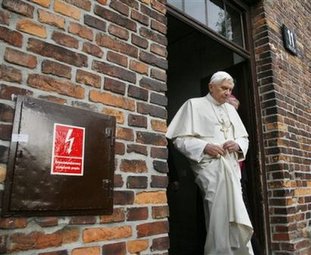 The words of Psalm 44 come to mind, Israel's lament for its woes: "You have broken us in the haunt of jackals, and covered us with deep darkness ... because of you we are being killed all day long, and accounted as sheep for the slaughter. Rouse yourself! Why do you sleep, O Lord? Awake, do not cast us off forever! Why do you hide your face? Why do you forget our affliction and oppression? For we sink down to the dust; our bodies cling to the ground. Rise up, come to our help! Redeem us for the sake of your steadfast love!" (Psalm 44:19,22-26).
The words of Psalm 44 come to mind, Israel's lament for its woes: "You have broken us in the haunt of jackals, and covered us with deep darkness ... because of you we are being killed all day long, and accounted as sheep for the slaughter. Rouse yourself! Why do you sleep, O Lord? Awake, do not cast us off forever! Why do you hide your face? Why do you forget our affliction and oppression? For we sink down to the dust; our bodies cling to the ground. Rise up, come to our help! Redeem us for the sake of your steadfast love!" (Psalm 44:19,22-26).This cry of anguish, which Israel raised to God in its suffering, at moments of deep distress, is also the cry for help raised by all those who in every age -- yesterday, today and tomorrow -- suffer for the love of God, for the love of truth and goodness. How many they are, even in our own day!
We cannot peer into God's mysterious plan -- we see only piecemeal, and we would be wrong to set ourselves up as judges of God and history. Then we would not be defending man, but only contributing to his downfall. No -- when all is said and done, we must continue to cry out humbly yet insistently to God: Rouse yourself! Do not forget mankind, your creature!
And our cry to God must also be a cry that pierces our very heart, a cry that awakens within us God's hidden presence -- so that his power, the power he has planted in our hearts, will not be buried or choked within us by the mire of selfishness, pusillanimity, indifference or opportunism.
Let us cry out to God, with all our hearts, at the present hour, when new misfortunes befall us, when all the forces of darkness seem to issue anew from human hearts: whether it is the abuse of God's name as a means of justifying senseless violence against innocent persons, or the cynicism which refuses to acknowledge God and ridicules faith in him.
Let us cry out to God, that he may draw men and women to conversion and help them to see that violence does not bring peace, but only generates more violence -- a morass of devastation in which everyone is ultimately the loser.
 The God in whom we believe is a God of reason -- a reason, to be sure, which is not a kind of cold mathematics of the universe, but is one with love and with goodness. We make our prayer to God and we appeal to humanity, that this reason, the logic of love and the recognition of the power of reconciliation and peace, may prevail over the threats arising from irrationalism or from a spurious and godless reason.
The God in whom we believe is a God of reason -- a reason, to be sure, which is not a kind of cold mathematics of the universe, but is one with love and with goodness. We make our prayer to God and we appeal to humanity, that this reason, the logic of love and the recognition of the power of reconciliation and peace, may prevail over the threats arising from irrationalism or from a spurious and godless reason.The place where we are standing is a place of memory. The past is never simply the past. It always has something to say to us; it tells us the paths to take and the paths not to take. Like John Paul II, I have walked alongside the inscriptions in various languages erected in memory of those who died here: inscriptions in Belarusian, Czech, German, French, Greek, Hebrew, Croatian, Italian, Yiddish, Hungarian, Dutch, Norwegian, Polish, Russian, Romani, Romanian, Slovak, Serbian, Ukrainian, Judeo-Spanish and English.
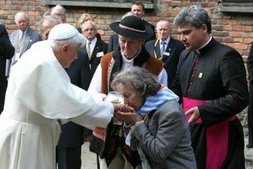 All these inscriptions speak of human grief, they give us a glimpse of the cynicism of that regime which treated men and women as material objects, and failed to see them as persons embodying the image of God.
All these inscriptions speak of human grief, they give us a glimpse of the cynicism of that regime which treated men and women as material objects, and failed to see them as persons embodying the image of God.Some inscriptions are pointed reminders. There is one in Hebrew. The rulers of the Third Reich wanted to crush the entire Jewish people, to cancel it from the register of the peoples of the earth. Thus the words of the Psalm: "We are being killed, accounted as sheep for the slaughter" were fulfilled in a terrifying way.
Deep down, those vicious criminals, by wiping out this people, wanted to kill the God who called Abraham, who spoke on Sinai and laid down principles to serve as a guide for mankind, principles that are eternally valid. If this people, by its very existence, was a witness to the God who spoke to humanity and took us to himself, then that God finally had to die and power had to belong to man alone -- to those men, who thought that by force they had made themselves masters of the world. By destroying Israel, they ultimately wanted to tear up the taproot of the Christian faith and to replace it with a faith of their own invention: faith in the rule of man, the rule of the powerful.
 Then there is the inscription in Polish. First and foremost they wanted to eliminate the cultural elite, thus erasing the Polish people as an autonomous historical subject and reducing it, to the extent that it continued to exist, to slavery.
Then there is the inscription in Polish. First and foremost they wanted to eliminate the cultural elite, thus erasing the Polish people as an autonomous historical subject and reducing it, to the extent that it continued to exist, to slavery.Another inscription offering a pointed reminder is the one written in the language of the Sinti and Roma people. Here too, the plan was to wipe out a whole people which lives by migrating among other peoples. They were seen as part of the refuse of world history, in an ideology which valued only the empirically useful; everything else, according to this view, was to be written off as "lebensunwertes Leben" -- life unworthy of being lived.
There is also the inscription in Russian, which commemorates the tremendous loss of life endured by the Russian soldiers who combated the Nazi reign of terror; but this inscription also reminds us that their mission had a tragic twofold aim: by setting people free from one dictatorship, they were to submit them to another, that of Stalin and the Communist system.
The other inscriptions, written in Europe's many languages, also speak to us of the sufferings of men and women from the whole continent. They would stir our hearts profoundly if we remembered the victims not merely in general, but rather saw the faces of the individual persons who ended up here in this abyss of terror.
I felt a deep urge to pause in a particular way before the inscription in German. It evokes the face of Edith Stein, Teresa Benedicta of the Cross: a woman, Jewish and German, who disappeared along with her sister into the black night of the Nazi-German concentration camp; as a Christian and a Jew, she accepted death with her people and for them.
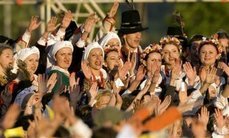 The Germans who had been brought to Auschwitz-Birkenau and met their death here were considered as "Abschaum der Nation" -- the refuse of the nation. Today we gratefully hail them as witnesses to the truth and goodness which even among our people were not eclipsed. We are grateful to them, because they did not submit to the power of evil, and now they stand before us like lights shining in a dark night. With profound respect and gratitude, then, let us bow our heads before all those who, like the three young men in Babylon facing death in the fiery furnace, could respond: "Only our God can deliver us. But even if he does not, be it known to you, O King, that we will not serve your gods and we will not worship the golden statue that you have set up" (cf. Daniel 3:17ff.).
The Germans who had been brought to Auschwitz-Birkenau and met their death here were considered as "Abschaum der Nation" -- the refuse of the nation. Today we gratefully hail them as witnesses to the truth and goodness which even among our people were not eclipsed. We are grateful to them, because they did not submit to the power of evil, and now they stand before us like lights shining in a dark night. With profound respect and gratitude, then, let us bow our heads before all those who, like the three young men in Babylon facing death in the fiery furnace, could respond: "Only our God can deliver us. But even if he does not, be it known to you, O King, that we will not serve your gods and we will not worship the golden statue that you have set up" (cf. Daniel 3:17ff.).Yes, behind these inscriptions is hidden the fate of countless human beings. They jar our memory, they touch our hearts. They have no desire to instill hatred in us: Instead, they show us the terrifying effect of hatred. Their desire is to help our reason to see evil as evil and to reject it; their desire is to enkindle in us the courage to do good and to resist evil. They want to make us feel the sentiments expressed in the words that Sophocles placed on the lips of Antigone, as she contemplated the horror all around her: My nature is not to join in hate but to join in love.
By God's grace, together with the purification of memory demanded by this place of horror, a number of initiatives have sprung up with the aim of imposing a limit upon evil and confirming goodness.
 Just now I was able to bless the Center for Dialogue and Prayer. In the immediate neighborhood the Carmelite nuns carry on their life of hiddenness, knowing that they are united in a special way to the mystery of Christ's cross and reminding us of the faith of Christians, which declares that God himself descended into the hell of suffering and suffers with us. In Oswiecim is the Center of St. Maximilian Kolbe, and the International Center for Education about Auschwitz and the Holocaust. There is also the International House for Meetings of Young people. Near one of the old prayer houses is the Jewish Center. Finally the Academy for Human Rights is presently being established. So there is hope that this place of horror will gradually become a place for constructive thinking, and that remembrance will foster resistance to evil and the triumph of love.
Just now I was able to bless the Center for Dialogue and Prayer. In the immediate neighborhood the Carmelite nuns carry on their life of hiddenness, knowing that they are united in a special way to the mystery of Christ's cross and reminding us of the faith of Christians, which declares that God himself descended into the hell of suffering and suffers with us. In Oswiecim is the Center of St. Maximilian Kolbe, and the International Center for Education about Auschwitz and the Holocaust. There is also the International House for Meetings of Young people. Near one of the old prayer houses is the Jewish Center. Finally the Academy for Human Rights is presently being established. So there is hope that this place of horror will gradually become a place for constructive thinking, and that remembrance will foster resistance to evil and the triumph of love.At Auschwitz-Birkenau, humanity walked through a "valley of darkness." And so, here in this place, I would like to end with a prayer of trust -- with one of the psalms of Israel which is also a prayer of Christians: "The Lord is my shepherd, I shall not want. He makes me lie down in green pastures; he leads me beside still waters; he restores my soul. He leads me in right paths for his name's sake. Even though I walk through the valley of the shadow of death, I fear no evil; for you are with me; your rod and your staff -- they comfort me ... I shall dwell in the house of the Lord my whole life long" (Psalm 23:1-4,6).
Zenit. Images from here.
The Rainbow At Auschwitz
 Divine Providence, through His Vicar, Pope Benedict XVI, on the feast of His Ascension, sends the sign of hope, peace and Everlasting Love to Poland and to the world with a rainbow and assures us that He is with us until the end of time!
Divine Providence, through His Vicar, Pope Benedict XVI, on the feast of His Ascension, sends the sign of hope, peace and Everlasting Love to Poland and to the world with a rainbow and assures us that He is with us until the end of time!Pope Benedict XVI prays for the victims of the Auschwitz-Birkenau concentration camp in Oswiecim, Poland, Sunday, May 28, 2006. (AP Photo/Andrew Medichini)
Image from here.
Feast of the Ascension of The Lord
 HOMILY BY THE HOLY FATHER MASS IN KRAKOW
HOMILY BY THE HOLY FATHER MASS IN KRAKOW28 May 2006
“Men of Galilee, why do you stand looking up to heaven?” (Acts 1:11).
Brothers and Sisters, today in Błonie Park in Kraków we hear once again this question from the Acts of the Apostles. This time it is directed to all of us: “Why do you stand looking up to heaven?” The answer to this question involves the fundamental truth about the life and destiny of every man and woman.
The question has to do with our attitude to two basic realities which shape every human life: earth and heaven. First, the earth: “Why do you stand?” - Why are you here on earth? Our answer is that we are here on earth because our Maker has put us here as the crowning work of his creation.
Almighty God, in his ineffable plan of love, created the universe, bringing it forth from nothing. Then, at the completion of this work, he bestowed life on men and women, creating them in his own image and likeness (cf. Gen 1:26-27). He gave them the dignity of being children of God and the gift of immortality. We know that man went astray, misused the gift of freedom and said “No” to God, thus condemning himself to a life marked by evil, sin, suffering and death. But we also know that God was not resigned to this situation, but entered directly into humanity’s history, which then became a history of salvation. “We stand” on the earth, we are rooted in the earth and we grow from it.
Here we do good in the many areas of everyday life, in the material and spiritual realms, in our relationships with other people, in our efforts to build up the human community and in culture. Here too we experience the weariness of those who make their way towards a goal by long and winding paths, amid hesitations, tensions, uncertainties, in the conviction that the journey will one day come to an end. That is when the question arises: Is this all there is? Is this earth on which “we stand” our final destiny?
And so we need to turn to the second part of the biblical question: “Why do you stand looking up to heaven?” We have read that, just as the Apostles were asking the Risen Lord about the restoration of Israel’s earthly kingdom, “He was lifted up and a cloud took him out of their sight.” And “they looked up to heaven as he went” (cf. Acts 1:9-10). They looked up to heaven because they looked to Jesus Christ, the Crucified and Risen One, raised up on high. We do not know whether at that precise moment they realized that a magnificent, infinite horizon was opening up before their eyes: the ultimate goal of our earthly pilgrimage. Perhaps they only realized this at Pentecost, in the light of the Holy Spirit. But for us, at a distance of two thousand years, the meaning of that event is quite clear. Here on earth, we are called to look up to heaven, to turn our minds and hearts to the inexpressible mystery of God. We are called to look towards this divine reality, to which we have been directed from our creation. For there we find life’s ultimate meaning.
Dear brothers and sisters, I am deeply moved to be able to celebrate this Eucharist today in Błonie Park in Kraków, where Pope John Paul II often celebrated Mass during his unforgettable Apostolic Visits to his native land. Through his liturgical celebrations he met the People of God in almost every corner of the world, but surely his celebration of Holy Mass in Błonie Park in Kraków was always something special. Here he returned in mind and heart to his roots, to the sources of his faith and his service to the Church. From here he could see Kraków and all Poland. In his first Apostolic Visit to Poland, on 10 June 1979, at the end of his homily in this Park, he said with nostalgia: “Allow me, before leaving you, to look out once again on Kraków, this Kraków whose every stone and brick is dear to me. And to look out once again from here on Poland.”
During the last Mass he celebrated here, on 18 August 2002, he said in his homily: “I am grateful for the invitation to visit my Kraków and for the hospitality you have given me” (no. 2). I wish to take up these words, to make them my own and repeat them today: I thank you with all my heart “for the invitation to visit my Kraków and for the hospitality you have given me.” Kraków, the city of Karol Wojtyła and of John Paul II, is also my Kraków! Kraków has a special place in the hearts of countless Christians throughout the world who know that John Paul II came to the Vatican Hill from this city, from Wawel Hill, “from a far country”, which thus became a country dear to all.
At the beginning of the second year of my Pontificate, I have felt a deep need to visit Poland and Kraków as a pilgrim in the footsteps of my predecessor. I wanted to breathe the air of his homeland. I wanted to see the land where he was born, where he grew up and undertook his tireless service to Christ and the universal Church. I wanted especially to meet the living men and women of his country, to experience your faith, which gave him life and strength, and to know that you continue firm in that faith. Here I wish to ask God to preserve that legacy of faith, hope and charity which John Paul II gave to the world, and to you in particular.
I cordially greet all those gathered in Błonie Park, for as far as my eyes can see and even farther. I wish I could meet each of you personally. I embrace all those who are taking part in our Eucharist by radio and television. I greet all of Poland! I greet the children and young people, individuals and families, the sick and those suffering in body or spirit, who are deprived of the joy of life. I greet all those whose daily labours are helping this country to grow in prosperity. I greet the Polish people living abroad, everywhere in the world. I thank Cardinal Stanisław Dziwisz, the Metropolitan Archbishop of Kraków, for his warm words of welcome. I greet Cardinal Franciszek Macharski and all the Cardinals, Bishops, priests and consecrated men and women, as well as the other guests who have come from many lands, particularly the neighbouring countries. My greetings go to the President of the Republic and to the Prime Minister, and to the representatives of the national, territorial and local Authorities.
Dear brothers and sisters, I have taken as the motto of my pilgrimage to Poland in the footsteps of John Paul II the words: “Stand firm in your faith!” This appeal is directed to us all as members of the community of Christ’s disciples, to each and every one of us. Faith is a deeply personal and human act, an act which has two aspects. To believe means first to accept as true what our mind cannot fully comprehend. We have to accept what God reveals to us about himself, about ourselves, about everything around us, including the things that are invisible, inexpressible and beyond our imagination. This act of accepting revealed truth broadens the horizon of our knowledge and draws us to the mystery in which our lives are immersed. Letting our reason be limited in this way is not something easy to do. Here we see the second aspect of faith: it is trust in a person, no ordinary person, but Jesus Christ himself. What we believe is important, but even more important is the One in whom we believe.
Saint Paul speaks of this in the passage from the Letter to the Ephesians which we have heard today. God has given us a spirit of wisdom and “enlightened the eyes of our hearts, that we may know what is the hope to which he has called us, the riches of his glorious inheritance in the saints, and the immeasurable greatness of his power in us who believe, according to the working of his great power in Christ” (cf. Eph 1:17-20). Believing means surrendering ourselves to God and entrusting our destiny to him. Believing means entering into a personal relationship with our Creator and Redeemer in the power of the Holy Spirit, and making this relationship the basis of our whole life.
Today we heard the words of Jesus: “You shall receive power when the Holy Spirit has come upon you; and you shall be my witnesses in Jerusalem and in all Judaea and Samaria, and to the end of the earth” (Acts 1:8). Centuries ago these words reached Poland. They challenged, and continue to challenge all those who say they belong to Christ, who consider his to be the greatest cause. We need to be witnesses of Jesus, who lives in the Church and in human hearts. He has given us a mission. On the day he ascended to heaven, he said to his Apostles: “Go into all the world and preach the Gospel to the whole creation … And they went forth and preached everywhere, while the Lord worked with them and confirmed the message by the signs that attended it” (Mk 16:15,20).
Dear brothers and sisters! When Karol Wojtyła was elected to the See of Peter in order to serve the universal Church, your land became a place of special witness to faith in Jesus Christ. You were called to give this witness before the whole world. This vocation of yours is always needed, and it is perhaps even more urgent than ever, now that the Servant of God has passed from this life. Do not deprive the world of this witness!
Before I return to Rome to continue my ministry, I appeal to all of you in the words spoken here by Pope John Paul II in 1979: “You must be strong, dear brothers and sisters. You must be strong with the strength that comes from faith. You must be strong with the strength of faith. You must be faithful. Today, more than in any other age, you need this strength. You must be strong with the strength of hope, the hope that brings perfect joy in life and which prevents us from ever grieving the Holy Spirit! You must be strong with love, the love which is stronger than death ... You must be strong with the strength of faith, hope and charity, a charity that is conscious, mature and responsible, and which can help us at this moment of our history to carry on the great dialogue with man and the world, a dialogue rooted in dialogue with God himself, with the Father, through the Son in the Holy Spirit, the dialogue of salvation” (Homily, 10 June 1979, no. 4).
I too, Benedict XVI, the Successor of Pope John Paul II, am asking you to look up from earth to heaven, to lift your eyes to the One to whom succeeding generations have looked for two thousand years, and in whom they have discovered life’s ultimate meaning. Strengthened by faith in God, devote yourselves fervently to consolidating his Kingdom on earth, a Kingdom of goodness, justice, solidarity and mercy. I ask you to bear courageous witness to the Gospel before today’s world, bringing hope to the poor, the suffering, the lost and abandoned, the desperate and those yearning for freedom, truth and peace. By doing good to your neighbour and showing your concern for the common good, you bear witness that God is love.
I ask you, finally, to share with the other peoples of Europe and the world the treasure of your faith, not least as a way of honouring the memory of your countryman, who, as the Successor of Saint Peter, did this with extraordinary power and effectiveness. And remember me in your prayers and sacrifices, even as you remembered my great Predecessor, so that I can carry out the mission Christ has given me.
I ask you to stand firm in your faith! Stand firm in your hope! Stand firm in your love! Amen!
From The Vatican
Read all of Pope Benedict's addresses during his apostolic trip to Poland here.
Pope Celebrates Mass With 900,000
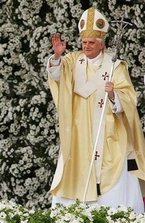 Pope Benedict XVI waves to an estimated 900,000 people during a mass in Krakow, Poland, on Sunday, May 28, 2006. Later the day, the German-born Pontiff heads to the former Nazi death camp Auschwitz-Birkenau before wrapping up his four-day visit to Poland. (AP Photo/Czarek Sokolowski)
Pope Benedict XVI waves to an estimated 900,000 people during a mass in Krakow, Poland, on Sunday, May 28, 2006. Later the day, the German-born Pontiff heads to the former Nazi death camp Auschwitz-Birkenau before wrapping up his four-day visit to Poland. (AP Photo/Czarek Sokolowski)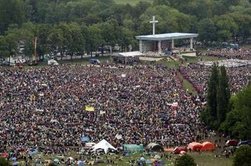 From Papacy and the Vatican.
From Papacy and the Vatican.
Holy Spirit Novena: Third Day

THIRD DAY (7th Sunday of Easter)
Thou, of all consolers best, Visiting the troubled breast, Dost refreshing peace bestow.
The Gift of Piety
The gift of Piety begets in our hearts a filial affection for God as our most loving Father. It inspires us to love and respect for His sake persons and things consecrated to Him, as well as those who are vested with His authority, His Blessed Mother and the Saints, the Church and its visible Head, our parents and superiors, our country and its rulers. He who is filled with the gift of Piety finds the practice of his religion, not a burdensome duty, but a delightful service. Where there is love, there is no labor.
Prayer
Come, O Blessed Spirit of Piety, possess my heart. Enkindle therein such a love for God, that I may find satisfaction only in His service, and for His sake lovingly submit to all legitimate authority. Amen.
Our Father and Hail Mary ONCE.
Glory be to the Father SEVEN TIMES.
Act of Consecration, Prayer for the Seven Gifts
ACT OF CONSECRATION TO THE HOLY SPIRIT
PRAYER FOR THE SEVEN GIFTS OF THE HOLY SPIRITOn my knees before the great multitude of heavenly witnesses, I offer myself, soul and body to You, Eternal Spirit of God. I adore the brightness of Your purity, the unerring keenness of Your justice, and the might of Your love. You are the Strength and Light of my soul. In You I live and move and am.
I desire never to grieve You by unfaithfulness to grace and I pray with all my heart to be kept from the smallest sin against You. Mercifully guard my every thought and grant that I may always watch for Your light, and listen to Your voice, and follow our gracious inspirations. I cling to You and give myself to You and ask You, by Your compassion to watch over me in my weakness.
Holding the pierced Feet of Jesus and looking at His Five Wounds, and trusting in His Precious Blood and adoring His opened Side and stricken Heart, I implore You, adorable Spirit, Helper of my infirmity, to keep me in Your grace that I may never sin against You. Give me grace, O Holy Spirit, Spirit of the Father and the Son to say to You always and everywhere, "Speak Lord for Your servant heareth." Amen.
O Lord Jesus Christ Who, before ascending into heaven did promise to send the Holy Spirit to finish Your work in the souls of Your Apostles and Disciples, deign to grant the same Holy Spirit to me that He may perfect in my soul, the work of Your grace and Your love.
Grant me the Spirit of Wisdom that I may despise the perishable things of this world and aspire only after the things that are eternal, the Spirit of Understanding to enlighten my mind with the light of Your divine truth, the Spirit of Counsel that I may ever choose the surest way of pleasing God and gaining heaven, the Spirit of Fortitude that I may bear my cross with You and that I may overcome with courage all the obstacles that oppose my salvation, the Spirit of Knowledge that I may know God and know myself and grow perfect in the science of the Saints, the Spirit of Piety that I may find the service of God sweet and amiable, and the Spirit of Fear that I may be filled with a loving reverence towards God and may dread in any way to displease Him.
Mark me, dear Lord, with the sign of Your true disciples and animate me in all things with Your Spirit. Amen.
Saturday, May 27, 2006
Holy Spirit Novena: Second Day
 JMJ+D
JMJ+DSECOND DAY (Saturday, 6th Week of Easter)
Come. Father of the poor. Come, treasures which endure; Come, Light of all that live!
The Gift of Fear
The gift of Fear fills us with a sovereign respect for God, and makes us dread nothing so much as to offend Him by sin. It is a fear that arises, not from the thought of hell, but from sentiments of reverence and filial submission to our heavenly Father. It is the fear that is the beginning of wisdom, detaching us from worldly pleasures that could in any way separate us from God. "They that fear the Lord will prepare their hearts, and in His sight will sanctify their souls."
Prayer
Come, O blessed Spirit of Holy Fear, penetrate my inmost heart, that I may set you, my Lord and God, before my face forever, help me to shun all things that can offend You, and make me worthy to appear before the pure eyes of Your Divine Majesty in heaven, where You live and reign in the unity of the ever Blessed Trinity, God world without end. Amen.
Our Father and Hail Mary ONCE.
Glory be to the Father SEVEN TIMES.
Act of Consecration, Prayer for the Seven Gifts
ACT OF CONSECRATION TO THE HOLY SPIRIT
PRAYER FOR THE SEVEN GIFTS OF THE HOLY SPIRITOn my knees before the great multitude of heavenly witnesses, I offer myself, soul and body to You, Eternal Spirit of God. I adore the brightness of Your purity, the unerring keenness of Your justice, and the might of Your love. You are the Strength and Light of my soul. In You I live and move and am.
I desire never to grieve You by unfaithfulness to grace and I pray with all my heart to be kept from the smallest sin against You. Mercifully guard my every thought and grant that I may always watch for Your light, and listen to Your voice, and follow our gracious inspirations. I cling to You and give myself to You and ask You, by Your compassion to watch over me in my weakness.
Holding the pierced Feet of Jesus and looking at His Five Wounds, and trusting in His Precious Blood and adoring His opened Side and stricken Heart, I implore You, adorable Spirit, Helper of my infirmity, to keep me in Your grace that I may never sin against You. Give me grace, O Holy Spirit, Spirit of the Father and the Son to say to You always and everywhere, "Speak Lord for Your servant heareth." Amen.
Image from here.O Lord Jesus Christ Who, before ascending into heaven did promise to send the Holy Spirit to finish Your work in the souls of Your Apostles and Disciples, deign to grant the same Holy Spirit to me that He may perfect in my soul, the work of Your grace and Your love.
Grant me the Spirit of Wisdom that I may despise the perishable things of this world and aspire only after the things that are eternal, the Spirit of Understanding to enlighten my mind with the light of Your divine truth, the Spirit of Counsel that I may ever choose the surest way of pleasing God and gaining heaven, the Spirit of Fortitude that I may bear my cross with You and that I may overcome with courage all the obstacles that oppose my salvation, the Spirit of Knowledge that I may know God and know myself and grow perfect in the science of the Saints, the Spirit of Piety that I may find the service of God sweet and amiable, and the Spirit of Fear that I may be filled with a loving reverence towards God and may dread in any way to displease Him.
Mark me, dear Lord, with the sign of Your true disciples and animate me in all things with Your Spirit. Amen.
From EWTN.
Friday, May 26, 2006
Poland Visit
Most text and images (except for the last one) are from Papacy and the Vatican.
 Pope Benedict XVI waves to people from his popemobile, as he drives through crowds gathered at the Pilsudski square to attend an open air Mass, in Warsaw, Friday, May 26, 2006. Pope Benedict XVI celebrated Mass for an estimated 270,000 people Friday in a rain-drenched Warsaw square where his predecessor, John Paul II, inspired Poland's Solidarity movement against communist rule in a historic 1979 visit. (AP Photo/Alik Keplicz)
Pope Benedict XVI waves to people from his popemobile, as he drives through crowds gathered at the Pilsudski square to attend an open air Mass, in Warsaw, Friday, May 26, 2006. Pope Benedict XVI celebrated Mass for an estimated 270,000 people Friday in a rain-drenched Warsaw square where his predecessor, John Paul II, inspired Poland's Solidarity movement against communist rule in a historic 1979 visit. (AP Photo/Alik Keplicz)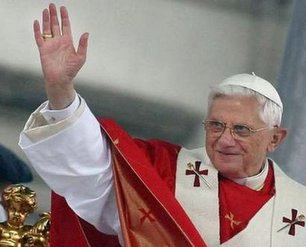
 Pope Benedict XVI waves before starting an open air mass in Warsaw May 26, 2006. Pope Benedict holds his first outdoor mass in Poland on Friday at the same spot where his predecessor John Paul electrified his compatriots in 1979 by encouraging them to defy their communist rulers. REUTERS/Michael Dalder
Pope Benedict XVI waves before starting an open air mass in Warsaw May 26, 2006. Pope Benedict holds his first outdoor mass in Poland on Friday at the same spot where his predecessor John Paul electrified his compatriots in 1979 by encouraging them to defy their communist rulers. REUTERS/Michael Dalder Some young people waiting for the Mass to begin.
Some young people waiting for the Mass to begin.  Polish President Lech Kaczynski receives the holy communion from Pope Benedict during an open air mass in Warsaw May 26, 2006. Pope Benedict held his first outdoor mass in Poland on Friday at the same spot where his predecessor John Paul electrified his compatriots in 1979 by encouraging them to defy their communist rulers. REUTERS/Pawel Kopczynski
Polish President Lech Kaczynski receives the holy communion from Pope Benedict during an open air mass in Warsaw May 26, 2006. Pope Benedict held his first outdoor mass in Poland on Friday at the same spot where his predecessor John Paul electrified his compatriots in 1979 by encouraging them to defy their communist rulers. REUTERS/Pawel Kopczynski
Pilgrims wait for Pope Benedict XVI to arrive to lead an open air mass in Warsaw May 26, 2006. Pope Benedict holds his first outdoor mass in Poland on Friday at the same spot where his predecessor John Paul electrified his compatriots in 1979 by encouraging them to defy their communist rulers. The banner reads, 'German people of Poland welcome the Holy Father.' Reuters/Jerry Lampen
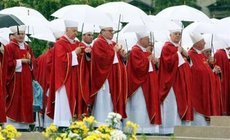
Cardinals and their umbrellas

Poland's Prime Minister Kazimierz Marcinkiewicz, right, kneels to greet Pope Benedict XVI upon his arrival at Warsaw's presidential palace, Poland, Thursday, May 25, 2006. (AP Photo/Pier Paolo Cito, Pool)
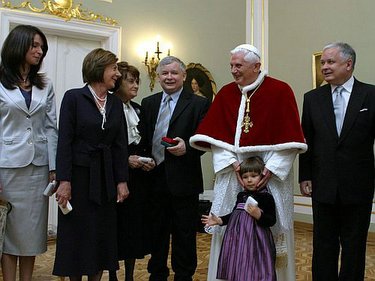
The President of Poland (extreme right) and his family.
This image was from commentator, Marketa at American Papist.
Holy Spirit Novena: First Day
 The novena in honor of the Holy Spirit is the oldest of all novenas since it was first made at the direction of Our Lord Himself when He sent His apostles back to Jerusalem to await the coming of the Holy Spirit on the first Pentecost. It is still the only novena officially prescribed by the Church. Addressed to the Third Person of the Blessed Trinity, it is a powerful plea for the light and strength and love so sorely needed by every Christian.
The novena in honor of the Holy Spirit is the oldest of all novenas since it was first made at the direction of Our Lord Himself when He sent His apostles back to Jerusalem to await the coming of the Holy Spirit on the first Pentecost. It is still the only novena officially prescribed by the Church. Addressed to the Third Person of the Blessed Trinity, it is a powerful plea for the light and strength and love so sorely needed by every Christian.FIRST DAY (Friday, 6th Week of Easter)
Holy Spirit! Lord of Light! From Your clear celestial height, Your pure beaming radiance give!
The Holy Spirit
Only one thing is important -- eternal salvation. Only one thing, therefore, is to be feared--sin. Sin is the result of ignorance, weakness, and indifference The Holy Spirit is the Spirit of Light, of Strength, and of Love. With His sevenfold gifts He enlightens the mind, strengthens the will, and inflames the heart with love of God. To ensure our salvation we ought to invoke the Divine Spirit daily, for "The Spirit helpeth our infirmity. We know not what we should pray for as we ought. But the Spirit Himself asketh for us."
Prayer
Almighty and eternal God, Who hast vouchsafed to regenerate us by water and the Holy Spirit, and hast given us forgiveness all sins, vouchsafe to send forth from heaven upon us your sevenfold Spirit, the Spirit of Wisdom and Understanding, the Spirit of Counsel and fortitude, the Spirit of Knowledge and Piety, and fill us with the Spirit of Holy Fear. Amen.
Our Father and Hail Mary ONCE.
Glory be to the Father SEVEN TIMES.
Act of Consecration, Prayer for the Seven Gifts
ACT OF CONSECRATION TO THE HOLY SPIRIT
PRAYER FOR THE SEVEN GIFTS OF THE HOLY SPIRITOn my knees before the great multitude of heavenly witnesses, I offer myself, soul and body to You, Eternal Spirit of God. I adore the brightness of Your purity, the unerring keenness of Your justice, and the might of Your love. You are the Strength and Light of my soul. In You I live and move and am.
I desire never to grieve You by unfaithfulness to grace and I pray with all my heart to be kept from the smallest sin against You. Mercifully guard my every thought and grant that I may always watch for Your light, and listen to Your voice, and follow our gracious inspirations. I cling to You and give myself to You and ask You, by Your compassion to watch over me in my weakness.
Holding the pierced Feet of Jesus and looking at His Five Wounds, and trusting in His Precious Blood and adoring His opened Side and stricken Heart, I implore You, adorable Spirit, Helper of my infirmity, to keep me in Your grace that I may never sin against You. Give me grace, O Holy Spirit, Spirit of the Father and the Son to say to You always and everywhere, "Speak Lord for Your servant heareth." Amen.
Image from hereO Lord Jesus Christ Who, before ascending into heaven did promise to send the Holy Spirit to finish Your work in the souls of Your Apostles and Disciples, deign to grant the same Holy Spirit to me that He may perfect in my soul, the work of Your grace and Your love.
Grant me the Spirit of Wisdom that I may despise the perishable things of this world and aspire only after the things that are eternal, the Spirit of Understanding to enlighten my mind with the light of Your divine truth, the Spirit of Counsel that I may ever choose the surest way of pleasing God and gaining heaven, the Spirit of Fortitude that I may bear my cross with You and that I may overcome with courage all the obstacles that oppose my salvation, the Spirit of Knowledge that I may know God and know myself and grow perfect in the science of the Saints, the Spirit of Piety that I may find the service of God sweet and amiable, and the Spirit of Fear that I may be filled with a loving reverence towards God and may dread in any way to displease Him.
Mark me, dear Lord, with the sign of Your true disciples and animate me in all things with Your Spirit. Amen.
From EWTN.
Thursday, May 25, 2006
Wednesday, May 24, 2006
Pope Asks For Prayers For Poland Trip
In his Wednesday audience, he renewed his request for prayers for his apostolic trip to Poland.
"After giving thanks to God for "the opportunity of fulfilling a desire I have long held in my heart," the Holy Father invited those present "to accompany me with your prayers on this apostolic trip which I undertake with great hope, and which I entrust to the Virgin Mary, so venerated in Poland. May she guide my steps that I may confirm the beloved Catholic community of Poland in the faith, encouraging it to face
the challenges of the present time with incisive evangelical action."
"May Mary," he concluded, "ensure that the entire nation is granted a renewed springtime of faith and civil progress, while conserving the memory of my great predecessor." (VIS)
From another source...
Pope Benedict XVI will be a man on a mission when he begins a visit to the Polish homeland of his predecessor Thursday, paying tribute to a pontiff so loved by his countrymen while pressing to keep the goals of his long papacy alive. With stops at Pope John Paul II's birthplace and his Krakow Archdiocese where millions always turned out to greet Poland's favorite son, Benedict's four-day pilgrimage is a journey down memory lane.
Asking for prayers for his trip during his public audience Wednesday, Benedict turned to Polish pilgrims and proclaimed the motto of the trip, "Remain strong in the faith."
"For a people who feel orphaned by the death of John Paul, he will be welcomed warmly," said the Rev. Adam Boniecki, a Pole who worked for years with the late pontiff at the Vatican. "He is seen as a friend, collaborator and supporter of John Paul."
But there is another side for Benedict, pursuing some of John Paul's aims that were left incomplete upon his death last year. They include making predominantly Roman Catholic Poland an example for secular Europe, further pursuing Polish-German reconciliation from the wounds of World War II, and strengthening sometimes bumpy Catholic-Jewish relations.In a particularly poignant moment, the visit will be capped by Benedict's stop Sunday at the Auschwitz-Birkanau death camp near Krakow, where Hitler's Nazi regime killed up to 1.5 million people, mostly Jews.
Organizers dropped initial plans for Benedict to ride through the Auschwitz gate under the infamous words "Arbeit Macht Frei" — "Work Sets You Free" — when it was recalled that Nazi soldiers drove through the gate while inmates walked. He will now arrive on foot.
John Paul stopped at Auschwitz during his first trip to Poland as pope in 1979, but a visit by the German pope carries further significance in efforts for closer Catholic-Jewish ties.
"I expect, like his predecessor, he will remind Christians of the unique debt that Christianity owes to its Jewish parent," George Weigel, an American biographer of John Paul, told The Associated Press. (Associated Press)
Pope Is Meek and Gentle
This reminded me of Pope Benedict XVI's pontificate and how he has tempered zeal with meekness.
"St. Anthony Mary Claret explains why evangelizers must temper zeal with meekness: '...Humility is like the root of a tree, and gentleness is its fruit. We please God by humility and our neighbor by gentleness. No virtue is so attractive as gentleness... Bad temper and anger - the lack of gentleness - often masquerade as zeal... The function of zeal is to abhor, flee, renounce, combat and overthrow everything that is contrary to God. But zeal is an ardent and violent love that needs to be wisely controlled... My God, give me a zeal that is discreet and prudent so that I may do everything strongly yet sweetly, gently yet thoroughly.'"
Bert Ghezzi Voices of the Saints: A Year of Readings (Doubleday)Courtesy of e-spirations from Franciscan University of Steubenville.
Saturday, May 20, 2006
Don't Delay Confession
The text below is taken from a short guide to confession printed by the Monastery of the Precious Blood, Watertown, NY 13601.
Place on they heart one drop of the Precious Blood of Jesus and fear nothing! - Pope Pius IX
Invitation: "Neither will I condemn you. Go your way and from now on sin no more." These are the words spoken by Jesus Christ, God, to the woman caught committing seriuos sin. Even to the thief on the cross, Jesus said: "This day thou shalt be with me in paradise."
No matter how deeply we have fallen into sin, we should never fear God because He is our Father who knows our weaknesses but loves us without limit. Never fear any priest in the confessional as he is God's representative placed there to help us, and he, too, is a sinner in need of God's mercy.
If it is a long time since your last confession, if there are some sins that you don't know how to confess or are afraid to tell the priest, if you are mixed up about past confessions, or if you have any questions or problems, ask the priest in the confessional to help you.DON'T POSTPONE YOUR CONFESSION.
THAT NEVER SOLVES ANYTHING.Review of life:1. Do I love God above all else? Do I put anything ahead of Him: money, power, sex? Blamed Him when I was dissatisfied?2. Have I sworn falsely? Used profanity?3. Have I heard Mass on Sunday? Prayed often?4. Do I respect my parents and all in authority? Been critical of them? Do I support my parents if they need it?5. Have I injured or endangered anyone by anger, drunkenness or carelessness? Have I used drugs or alcohol to excess?6. Have I been pure in thought, word and deed? Had an abortion? Advised, procured or participated in one?7. Have I stolen? Damaged property? Given to the Church?8. Have I lied about anyone? Damaged anyone's reputation?9. Have I been jealous or envious? Been mean or petty toward those who have more than I?10. Have I respected the marriage bonds of others even in my thoughts?Act of Sorrow:My God, I am sorry for my sins with all my heart. In choosing to do wrong and failing to do good, I have sinned against You Whom I should love above all things. I firmly intend, with Your help, to do penance, to sin no more, and to avoid whatever leads me to sin. Our Saviour Jesus Christ suffered and died for us. In His name, my God, have mercy.
Roundup of Posts
I found some great posts over this weekend.
Yesterday, May 19th was the Anniversary of the Birth of the great John Paul II that was reminded to us by Moneybags at A Catholic Life.
The Holy Vocations Blog posts on The Missionaries of the Gospel of Life, an order started by Fr. Frank Pavone of the Priests for Life.
Also yesterday was the feast of ST. DUNSTAN. Check out the beautiful icon posted by Dunstan at Deus In Adiutorium.
Thursday, May 18, 2006
The Trap of DVC
The Da Vinci Code will be premiering on Friday, May 19th. First of all, let me urge all Catholics and Christians, if not all people, NOT to watch this movie.
What is it about the movie that attracts so many people? Well, for one thing, it’s a Hollywood movie with names attached to Hollywood – Ron Howard and Tom Hanks. Many will not want to miss it. If you are a Hollywood buff, you’ll definitely be out there on opening night. For someone who is simply curious, you will want to know what the hype is all about. But I urge Catholics not to fall into this trap!
Many will see the movie simply finding it as pure fun and entertainment. “It’s just a movie!” will be the common but lame excuse. Well, this is not JUST a movie, it is dissemination of information that is heretical in the guise of entertainment; it is a gross misrepresentation of the prelature of Opus Dei and it is a violent attack against Holy Mother Church.
Just what are the implications of this movie from a Catholic perspective?
First, let us look at the economic implications:
Tom Hank’s and Ron Howard’s average draw at the box office during the first week is between $12 million to $14 million and grossing up to $89 million. As we never really know how a movie will do at the box office, the first week is always a pretty accurate measure of a film’s success. The less people attend the movie on the first week of showing, the lesser the chances for its success at the box office. I urge Catholics not to see the movie. If a Catholic decides to see this movie for whatever reason, he or she must avoid it during the first week. The first week is critical in determining how a movie does at the box office. And we must never allow the movie’s success at any level.
Second, let us look at the literary implications:
Dan Brown is not Catholic. He does not know anything about the Catholic Church. He claims the story is fictional. However, fiction is defined as “something invented by the imagination or feigned”. If we are Catholics, then we believe and proclaim that Jesus is the Way, the Truth and the Life. Otherwise, we are not Catholics. Then how can a movie be fiction for us if Jesus is a subject of the movie? It simply does not make any sense. If we dismiss the Da Vinci Code as fiction and harmless, then we cannot call ourselves Catholics. If we believe the DVC is not fiction, then we are being deceived because the whole story is a big lie.
Third, let us look at the spiritual implications:
Since the eyes and ears are windows to the soul, the movie will definitely have an impact to the soul even if one’s goal is to better understand the movie in defense of the faith. If you intend to defend the faith, you can simply read “The Da Vinci Hoax”. For those who are weak in faith and who do not study nor live their faith, watching the movie may prove to be a false catechism for them. They will likely believe what they hear about Jesus and the Church. They wouldn’t know any better. They are likely to believe that Opus Dei is a secret society run by albino monks. They are likely to believe that Jesus was married to Mary Magdalen. They are likely to believe lies.
Hungry for the truth? Read the Bible instead.

